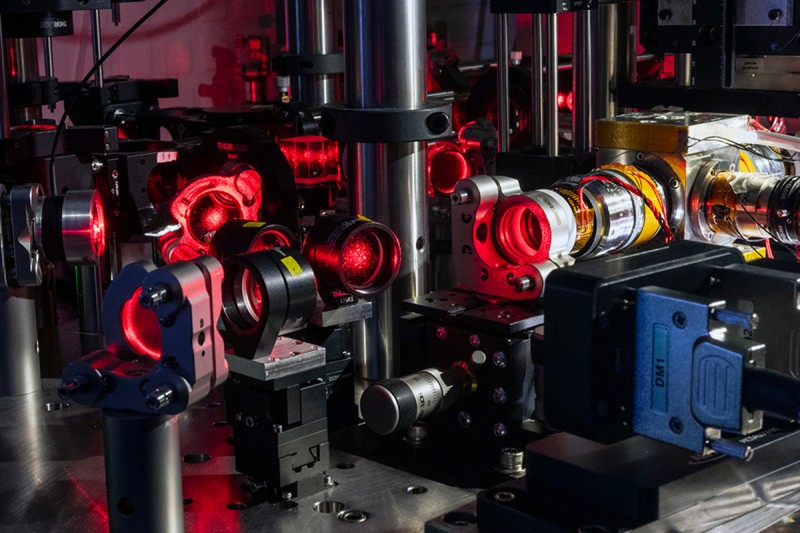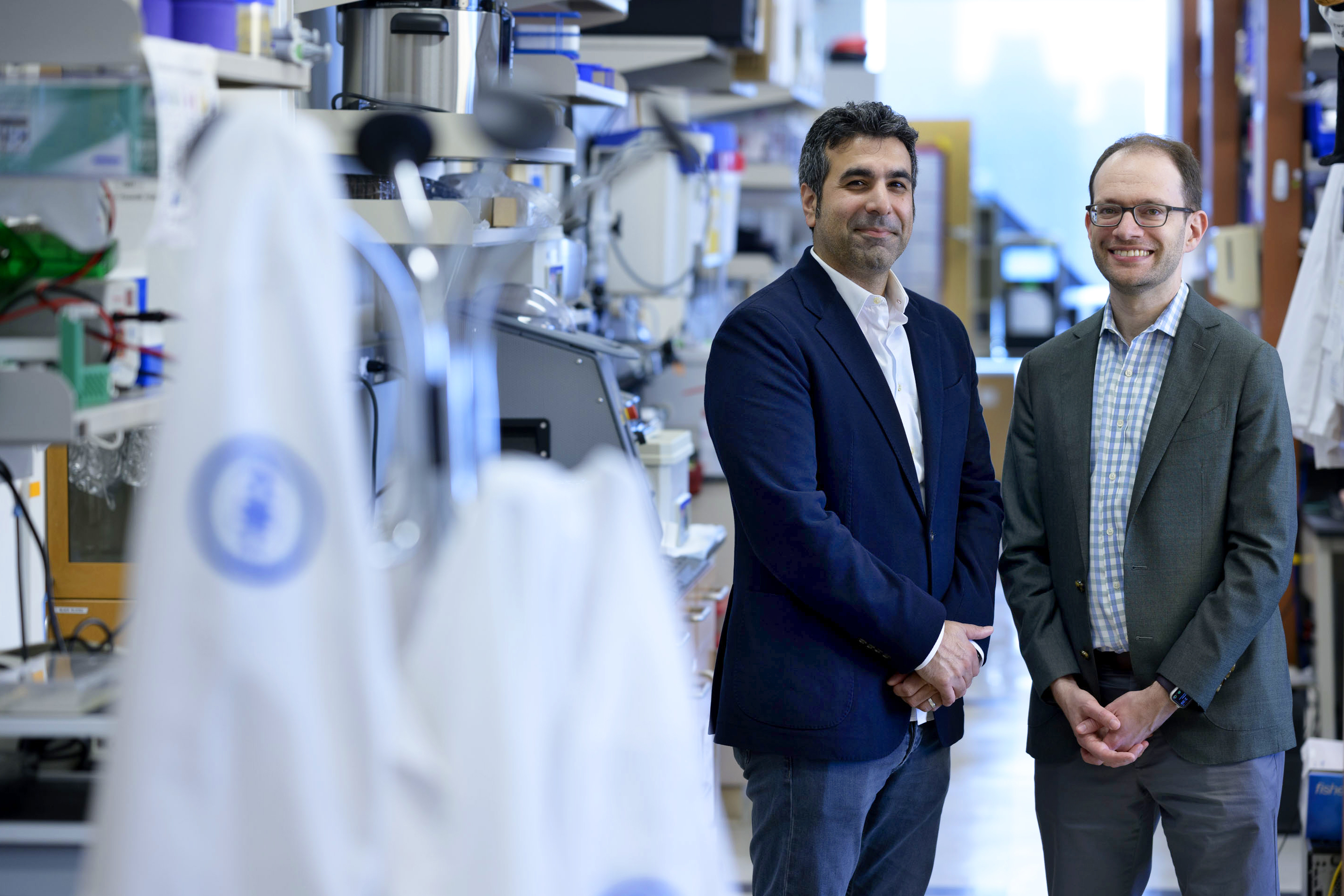
The Pat and Ian Cook Doctoral Program in Cancer Engineering
Aspiring researchers now have the chance to join a first-of-its kind PhD program to prepare them for an exciting new field of cancer science. The Pat and Ian Cook Doctoral Program in Cancer Engineering at Memorial Sloan Kettering Cancer Center trains PhD students to develop new technologies and use engineering techniques to solve fundamental problems in biology and to better understand, diagnose, and treat cancer.
This visionary PhD program offers a rare opportunity for promising engineers to gain a deep understanding of cancer biology while developing the tools to solve problems in the lab and the clinic.

Cancer Engineering to Transform Diagnosis and Treatment
Program Co-Directors Daniel Heller, a biomedical engineer, and Kayvan Keshari, a bioengineer and biochemist, believe in the potential of cancer engineering to transform diagnosis and treatment. “In most institutions, you can develop amazing technologies but never translate your ideas,” says Dr. Keshari. “At MSK, you might actually be able to do something that can change someone’s life.”
Memorial Sloan Kettering offers a unique concentration of advanced technologies in nanotechnology, imaging, immuno-engineering, integrative computational biology, and genetic engineering, along with unparalleled access to cutting-edge tools such as nanomaterials, CRISPR, organoids, atomic force microscopes, and 3D printers.
The program welcomes students from a variety of backgrounds, including those with an engineering or physical science focus.
Because this academic program is connected to a cancer hospital, students training for a PhD in Cancer Engineering have the rare privilege of seeing their innovative engineering lab work translate into real-world impact. They learn to ask and understand the critical questions of cancer biology, develop solutions, and even see their inventions enter clinic use.
Cancer Engineering PhD Areas of Focus
GSK laboratories develop and utilize nanomaterials to study biology in living cells and tissues and to target the delivery of precision drugs to diagnose and treat diseases, including immunotherapies and other targeted medicines for the treatment of cancer. Researchers are developing novel nanomaterial delivery platforms using biomaterial scaffolds, inorganics, and nanocarbons for the targeted delivery of small molecule and biologic therapies, including RNA. Our laboratories have made fundamental discoveries into how to target the delivery of nanotherapeutics into cancers, leveraging for example prostate-specific membrane antigen (PSMA) and P-selectin modes of targeting, and we continue to develop nanotechnologies for cancer diagnosis and therapy, including implantable nanosensors that are in clinical studies for the detection of ovarian cancer. We study and leverage nanotechnology and engineer biomaterials to make foundational biological discoveries in living cells and tissues, and to harness the power of targeted and implantable methods of disease detection and therapy.
GSK laboratories perform research focused on advanced imaging and probe development, utilizing components such as small molecules, proteins, and nanoparticles to make breakthroughs in understanding biological mechanisms and to learn how to better diagnose and treat cancer. Our laboratories have used advanced imaging to study cellular processes with unprecedented detail, like gene transcription, organelle biogenesis and turnover, and cell death, to uncover new fundamental insights into how tissues develop or become damaged by disease. We are also world leaders in studying protein structures and their dynamics using the latest in Cryo-EM. And we have pioneered first in human studies of a nanoparticle for surgical imaging; the use of radiolabeled antibodies for imaging and treatment; and the translation of hyperpolarized pyruvate MRI into humans to study cancer metabolism. Faculty at MSK are also developing and translating novel imaging techniques including Cerenkov imaging and multiplexed PET. Our research efforts have led to clinical translation for a number of new cancer imaging probes, with over 35 FDA Investigational New Drugs for interrogating and treating cancer. Memorial Sloan Kettering labs combine the latest insights in cancer, cell, developmental and structural biology, immunology, genomics, physics, nanotechnology and pharmacology, with state-of-the-art technologies including Cryo-EM, advanced light microscopy, CT, PET, MRI, optical, acoustic, and Raman imaging, to achieve new scientific breakthroughs and to learn how to better diagnose and treat cancer.
GSK laboratories have made foundational discoveries that have propelled immuno-engineering. Memorial Sloan Kettering faculty were the first to report the potential of chimeric antigen receptor (CAR) T cells to induce remissions in adult patients with refractory acute lymphoblastic leukemia, and we continue to push the leading edge in designing next-generation CAR T cells, as well as identifying crucial toxicities associated with this form of engineered cell therapy. Our faculty develop and study checkpoint inhibitors, including anti-PD1 and anti-CTLA4, and we are running clinical trials to learn how to leverage their use in cancer therapy. Our laboratories have engineered therapeutic antibodies, including omburtamab, which received an FDA Breakthrough Therapy Designation and accelerated approval for the treatment of metastatic neuroblastoma. And we continue to define immune subsets and regulatory pathways that impact, for example, T cells, macrophages, and NK cells, in modulating anti-cancer immune responses, to make new breakthroughs in our understanding of immune system function and to pioneer the next wave of discoveries that will revolutionize cancer therapy.
GSK laboratories in two world leading departments at Memorial Sloan Kettering, the Computational and Systems Biology Program and the Computational Oncology Program, have pioneered major discoveries in biology and oncology and developed next generation computational tools and platforms. Our laboratories have developed statistical methods to identify cell states and how they change across developmental time or under disease conditions, and to discover the genes that drive these changes. We have developed widely used machine learning approaches to study tumor cell evolution and to predict gene function, RNA splicing and regulation, and how certain proteins bind specifically to DNA or RNA. Our laboratories have also aided in the development of new technologies including methods to profile tissues by quantitatively imaging multiple proteins or genes, and to perform large-scale genetic screens using CRISPR gene editing. Our research also spans cancer evolution, immuno-oncology, translational genomics, biomarker discovery, tumor metabolism and genetic ancestry effects. And our efforts have led to front line initiatives such as MSK-SPECTRUM (Spatio-temporal evolution of cancer traced using multimodalities); The MSK-MIND (multimodal data integration) that develops infrastructure and tools for the de-identification, compute-readiness and joint analysis of radiologic, histologic, genomic, molecular and clinical data, routinely accumulated as patients receive care at MSK; cBioPortal, a platform for the visualization and analysis of large-scale cancer genomic data; and OncoKB™, a precision oncology knowledge base and the Multimodal Metabolism Map, an effort to collect, harmonize and analyze high dimensional metabolic data from primary tumors and adjacent healthy tissue. Memorial Sloan Kettering is also one of 11 NCI Human Tumor Atlas Network centers and generates high-resolution 3D atlases of the transition from local to metastatic cancer.
Genetic engineering, the deliberate modification of organisms, cells, tissues, or viruses by manipulation of their genomes, has led to groundbreaking discoveries in molecular biology and genetics as well to the development of innovative animal models and therapies for human disease. At Memorial Sloan Kettering, our faculty are world leaders in developing tools to study how normal cells and tissues function, and to uncover how major biological processes go awry during the development of diseases like cancer. Our researchers use genetic and tissue engineering to design new screening platforms to uncover how gene regulatory networks specify cell fates; to generate complex animal models in mice and fish; and to manipulate and study animal and patient-derived organoids. We have made major discoveries to understand how cancers arise and metastasize; how processes of tissue repair are regulated and related to the development and progression of disease; how aging and dysfunctional cells can be targeted for removal using novel mouse models; and we continue to drive new knowledge in understanding how cells and tissues in complex organs such as the brain are organized. Our faculty are also world leaders in generating cells and tissues from stem cells, which allows us to better understand organism development and to design new living cell and tissue-based therapies.
Meet The Program Donors

